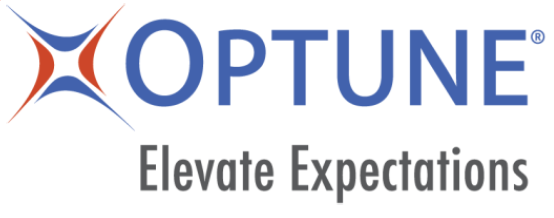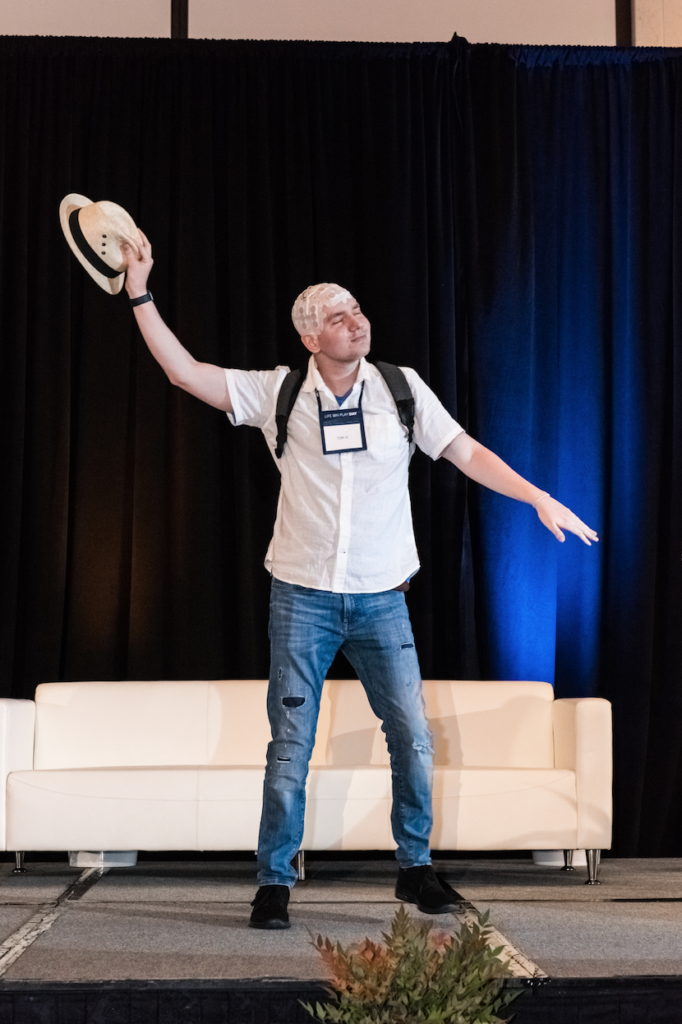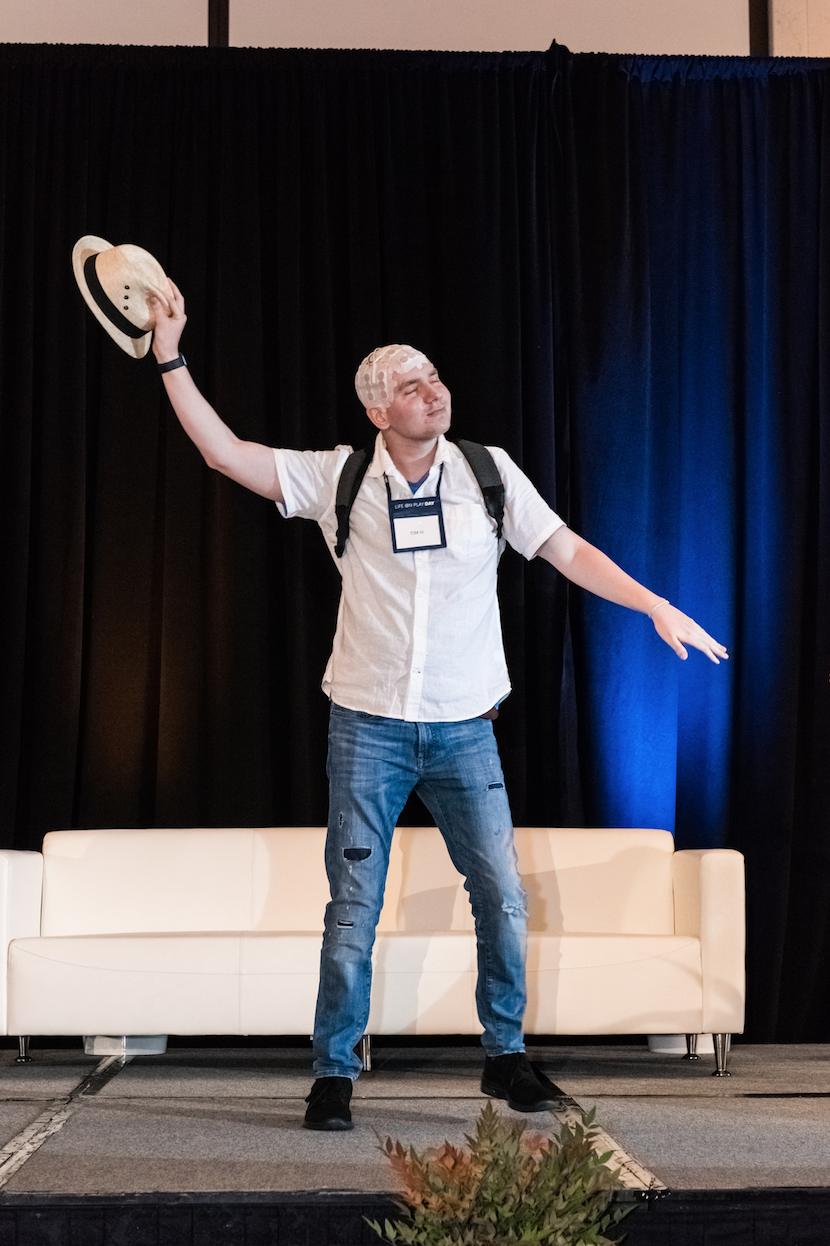Optune® Ambassador Program – Patient Story – Tim
September 10, 2019

Written by Optune Ambassador Tim H.
I think probably the most important thing to know about me is that I’m always looking for the good in situations, even if they’re dark. If I can crack a joke, I will.
Hi everyone, my name is Tim. I’d like to take this opportunity to thank Novocure for making it possible for me to share my story with you today.
For fun, I like to watch movies and participate in fitness activities and volunteer work. Before glioblastoma, or GBM, my life consisted of part-time work, spending time with friends, and going to the gym. I went to college for occupational therapy because I’ve had health problems in the past and had experiences with PTs and OTs. I wanted to give that kind of support to somebody else.
A few years ago, something weird happened and messed up my routine. One spring night when I was still in school, I was getting ready to play softball and I collapsed. I’d had minor, febrile seizures as a small child but had never been diagnosed with anything. This was different. This time, I had a grand mal seizure. I woke up in an ambulance after it happened, confused and unable to remember anything. The paramedics told me I’d had a seizure, and all I could say was, “No I didn’t.” At the hospital, imaging showed that I had two brain tumors, cancerous but treatable. Not GBM. I had surgery to remove them.
The most annoying thing about the timing of the seizure and operation was that they came right in the middle of my college finals, and there were a couple of classes that I had to go back and take over. You’d think professors would hear me say, “Sorry, but I was having brain surgery,” and show a little mercy. But, you know…. German finals wait for no man. That is serious stuff.
After I recovered, I went back to school and did my occupational therapy assistant clinicals. I had regular imaging done to make sure that everything was okay, and I didn’t have any seizures or anything.
For a while, there wasn’t even a thought in my head that I could have another tumor. When the time came, it was a complete shock.
I was in the last week of my internship. I’d gone in for routine imaging earlier that month, not expecting to hear anything, of course. Why would I? But one afternoon, I received a call from my doctor’s office requesting to see me. Initially, I didn’t tell my parents or older brother about this because I wanted all of us to relax and celebrate my graduation. That night, I walked across the stage and received my occupational therapy assistant degree.
I had my brother drop me off the next morning for the appointment because I truly wasn’t expecting any bad news. My neuro-oncologist was frustrated. She said, “I’m mad at you, Tim. Why did you come alone?!” And then she told me they’d found another tumor, that we’d need to operate again, and then I would need to wait for the pathology report.
The week after I found out about the new tumor, I had another brain surgery. When I went back to the hospital for the results, I took my mom and dad with me. Truthfully, I was expecting the tumor to be cancerous but treatable because that’s what had happened before. When it was diagnosed as GBM, I was shocked.
I’m very close with my mom; she’s a brilliant lady and used to work as a speech pathologist. She asked all these questions about my life expectancy at the appointment with the neurologist. At home, I told her not to look up GBM on the internet, but she did it anyway—she saw numbers and dates that were very upsetting. My mom ended up retiring early after my diagnosis so she could be there to care for me.
My neuro-oncologist suggested four treatment plans for GBM. I could do 1) just chemo, 2) just radiation, 3) chemo and radiation, or 4) chemo, radiation, and something called Optune. She thought the last plan would be the best for me.
My neuro-oncologist told me that Optune was a wearable, portable, FDA- approved device intended as treatment for GBM in adult patients. She gave me a booklet about it and I looked through it. I thought at first that I’d be able to take the arrays off and put them on quickly, and that it would be a treatment that might only take a year. I was surprised when I learned I’d need to use it 75 percent of the time, which translates to 18 hours a day.

My neuro-oncologist and I talked about the benefits and risks of Optune when used in combination with temozolomide (TMZ). Knowing I’d have to use Optune pretty much 24/7 was a big deal to me. But if it could give me a chance, I wanted to try it.
nCompass™, Novocure’s support program, provided me with an electric shaver so I could get a nice, close shave. Later in my process, I went to a storefront barber and asked the stylist to take my hair all the way down to a fine buzz. She sort of hesitated and said that there were better looks for me, so I ended up explaining why. I needed, and still need, a very short haircut. I go in later myself and shave it down to the skin. The arrays need to be as close as possible to my scalp so that Optune’s low-intensity electric fields (TTFields) can potentially work to slow or stop cancer cells from dividing. The stylist cried a little and gave me the haircut for free.
Once I started using Optune, I did notice some side effects: a little bit of fatigue, tiredness, and some irritation of the scalp. My doctor prescribed some ointment for me to put on my head and told me to give myself a break when that happens. I always have to wash off my scalp in the shower before I put the new arrays on.
Also, I named my Optune. I named her Tina. I don’t know too many Tinas. I didn’t want to name it the same thing as someone I knew. That’s like giving your dog the same name as your friend. I joke all the time about her, and I introduce us by saying, “This is Tina. I’m Tim.” If she’s something that’s mine for life, why not name her? When I’m frustrated, I call her Felicia, so I can say, “Bye, Felicia.” Because it brightens the mood.
Optune is something I had to adapt to. At first, I would forget to grab the backpack when I got up from the couch. I would unplug it every time I moved to another area of the house. But with time, I figured out how to work it into my life. My nCompass Device Support Specialist (DSS) was very helpful, sharing tips on how to do this. Slowly, I started doing all the things I use to do before Optune. With permission from my doctor, I went to the gym with it. I am now able to go out with friends and work out again, which honestly feels great. At the gym, I do a lot of exercises with the backpack on. For the exercises that I need it off my back, I still stay connected to Optune; I just put the bag on the ground next to me.
My family has been really
supportive in their own way. My mom has been my champion. My dad and brother are both
introverts and I think my dad
especially internalized a lot of his grief. He kept it all in and
wouldn’t really speak of it for a while. My mom is easier to talk to. But
everyone processes this journey in different ways. Sometimes I have to be
proactive in my communication with my family and we have found a system that
works for us. I’ve got a good relationship with my neuro-oncologist. I do see a therapist as well, and I’m involved in a
support group with other GBM patients.
I’ve gone on vacation with Optune—after clearing the trip with my doctor, of course. We live in the Midwest, so we like to see sun and water. The first time I flew on an airplane while using Optune, my family and I went to St. Augustine, Florida. There were a couple of extra steps I needed to take when flying with Optune. Remember that nCompass, Novocure’s support program, is there to ensure patients have the supplies needed to travel and can ship supplies efficiently, making it easier to prepare for trips. When planning a flight, call the airline ahead of time to prepare them for Optune and ask if any concessions can be made, like priority seating. During vacation, my doctor said I could take it off when I was swimming and put it back on at night as long as I was still banking hours and reaching that 75 percent. It is important that you do not get the device or the arrays wet. If I’m not going to do something in the water, I keep it on.
I’m doing pretty well today, staying active and positive. My latest MRI showed something, and I was pretty concerned at first. The doctors weren’t sure if the tumor was back or if I had a cyst, but it turned out to be something called “treatment affect” basically, it was dead cancer cells. To me, that was really encouraging.
I’m making plans for things that I’d like to do and experience. In the future, I would love to start working in the field of occupational therapy, and I for sure want to travel, especially to Europe.
When people see me using Optune and they make little comments, I try to judge if it’s worth it to go into my spiel. Sometimes people make jokes and though it can be hurtful, I try not to hold it against them because they just don’t know any better. If someone really wants to know about my story and treatment, I’ll take the opportunity to tell them about my experience with Optune. But if somebody well-meaning says to their kid, “Look, he must be listening to music,” I just say, “Yep, I’m listening to future music,” or something like that.
I’m happy to talk to people if they want. I just want to help. I love being able to point other people toward the positive, even in the darkest of times.
Thank you for listening.
